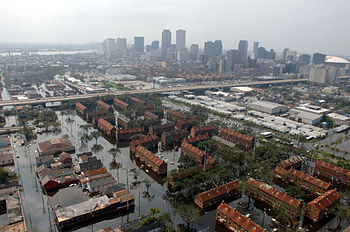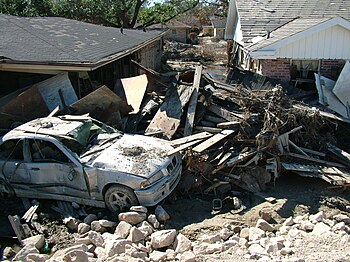By Mark
Goldwich
In this
blog, I want to give you examples of what I call early-phase delays. These are
delays that come in the first stage, the stage immediately following the disaster
or insured loss. These examples of delay are sometimes the most shocking ones to
people who file claims, because they expect to be treated as customers, rather
than adversaries, by their insurance company. (By the time policyholders get to
mid-phase and late-phase delays, they’re not quite as shocked by the behavior of
some insurance companies and other players who are supposed to represent their
interests.)
Q&A: What will happen?
 |
| English: New Orleans, La. August 30, 2005 --Aerial view of New Orleans and the surrounding area showing the flood waters and damage caused from Hurricane Katrina. New Orleans continues to be evacuated as a result of floods caused by failures of the Federal levee system. Photo by Jocelyn Augustino/FEMA (Photo credit: Wikipedia) |
• Will
there be enough manpower to process the claims that (predictably) follow a
natural disaster?
No. A cynic
might tell you that this manpower shortage is intentional. I can’t know what
the intentions of large organizations like insurance companies are, so all I
will be able to say for sure is that, the insurance company will not have
enough people on the ground to process the deluge of claims that will follow a
major fire, flood, hurricane, tornado, or other significant event. By a
remarkable coincidence, this works to their financial benefit. And believe it
or not, this “manpower shortage coincidence” takes place over and over again,
year after year.
• Are you
talking about the first few days following the disaster before the insurance
company “calls in the troops”?
No, I mean
a period of weeks or months immediately following the catastrophe that triggers
your insurance claim. And for many insurance companies, there really are no full-time
“troops” for them to call in.
• Why not?
Insurance
companies generally staff on a permanent basis at a level that’s meant to
handle claims that take place for more common events like kitchen fires, pipe
leaks, thefts, and other routine forms of property damage or loss. In other
words, they simply don’t hire enough permanent claims staff to cover disasters
in addition to the more ordinary claims.
• Is that
because insurance companies don’t know whether disasters will actually take
place in a given twelve-month period?
Given the industry’s
historic obsession with probability, and with actuarial statistics connected
specifically to things like fires, floods, hurricanes, and tornadoes, this
seems like an unlikely explanation. Some of the larger insurance companies do
hire additional staff to handle catastrophe situations, but certainly not as many
as are actually needed.
• Could
they hire enough full-time staff to do the job for disasters that they know, or
strongly suspect
 |
| Westend11NovUpyachtsK (Photo credit: Wikipedia) |
will eventually take place?
If you mean
“can they afford to,” that’s a matter best discussed with the executive management
teams, boards of directors, and stockholders of insurance companies.
Although
I’m a former insurance company employee myself, I was not privy to these sorts
of internal decisions in any meaningful detail.
• So how do
insurance companies process claims if they don’t have the manpower to handle
them?
Basically,
they outsource. In much the same way that Information Technology companies
outsource programming and technical service jobs to other countries, insurance companies utilize independent adjusting firms that
subcontract with adjusters who can be sent to a disaster site to work for an
insurance company.
• What happens if there is no disaster?
If there is
nothing going on in the form of insurance work, then these people have to fend
for themselves. Some are able to work year-round for insurance companies. Many others
go back to whatever work they did before deciding to be Independent Adjusters. And
still others just wait for the next disaster, living for extended periods off
money made working the last disaster – semi-retired, I call them.
• What
kinds of credentials are adjusters required to have?
Less than
you might think. In many states, they don’t have to have a college degree or
even need to be licensed. Even in states which require a license, the Independent
Adjusters don’t need to be licensed before the storm; they simply get “temporary”
or “emergency” licenses once they start working for the insurance company. They
could literally be hauling manure one day, and adjusting your loss the next.
 |
| New Orleans after the Hurricane Katrina levee failure disaster. (Photo credit: Wikipedia) |
• Once a
storm hits, are there lots of insurance adjusters swinging quickly into action?
The insurance companies would say yes, and you can be sure there will be a news
clip with at least o
ne adjuster quickly on the scene looking appropriately
concerned. Even so, my personal experience is that there are not nearly enough
adjusters getting to the site when they should, and I believe most storm
victims would agree with me. Ultimately, the answer depends on one’s
definitions of the words “lots”, “quickly”, and “action.” I can predict,
confidently, that you won’t consider the adjuster’s appearance to be timely.
• What’s
the holdup?
When a
storm or other disaster hits, the independent adjusting firms get a call from
the insurance company. Their people start calling people, who start calling
other people, who start calling still other people. Then the independent
adjusting firms start looking for a place to set up their offices, or perhaps
they wait for the insurance company to set up
facilities.
As a practical matter, independent adjusters (who are the people typically
given assignments through these companies) are usually left to their own
devices when it comes to traveling to the disaster site, finding a hotel to stay
at and securing other support services. You can imagine how difficult it is to
secure undamaged, available housing and office space right after a disaster.
Needless to say this, too, slows down the processing of your claim.
• What
actually happens when I call the insurance company?
If you can
get through at all, you’ll probably get the number of a claims call center.
• Okay,
what happens when I reach the call center?
Typically,
they take your information. They can’t do much of anything else. Unlicensed
call center personnel often can’t even tell you how much the deductible is on
your policy. These people are temporary employees who are not well trained and
(usually) not particularly motivated. They take down the information, either
handwritten on a simple store bought pad or company created sheet of paper, or
they may transmit an e-mail or generate a message printout. Each of these calls
represents a message that an adjuster working for that company is supposed to
return. That is, if the message gets to the right place.
 |
| English: (Photo credit: Wikipedia) |
• How long is
it going to be before I hear from that adjuster to set up a time for inspection of my property?
This is the
sixty-four-thousand dollar question. The best answer is that you should
probably be prepared to wait anywhere from one week to three months to get even
an initial call back. I would suggest if you haven’t heard back after a day or
two, you should call back – the adjuster probably lost your message. Call,
leave message, wait, repeat. Call, plead, leave message, wait, repeat. Call,
plead, plead some more, leave message, wait, repeat. Does this really sound
like something you’d like to do while you’re without power, without air
conditioning, without hot meals, and without clean water … for, say, two
months?
• You’re
kidding, right?
I wish I
were. I recently talked to an adjuster on behalf of one of my clients after a
natural disaster. When I finally was able to speak to him after weeks and weeks
of calling with no response, I asked him to explain his failure to return my
messages. He said, “Look, I get 80 messages a day and I have time to return
maybe ten of those messages before I get another 80 the next day. That’s the
system. You do the math.”
• That’s an
exceptional case, right?
No, I’m
afraid that was quite typical for this insurance company – and probably not too
different from most other companies. It really is all about staffing. The call
center folks
are there,
but they can’t help. You need to talk to the adjuster. But the adjuster is not
there. He or she is out “in the field” adjusting losses. If they were available
to talk to you, who would adjust all the losses?
• Is it a Catch-22,
or is it just a coincidence that happens to benefit the insurance company?
Whatever it is, it’s not going to work out in your favor.
• Couldn’t
insurance companies afford to do this differently?
One would certainly
think so. The question then is at what cost? Odds are the insurance
companies
would find it too expensive to provide the level of service expected by consumers.
• So do I
have to wait a couple of weeks for the insurance company and the independent
adjusting company to set things up … and then another week to three months more
just to hear back from the adjuster for the first time?
That’s pretty
much par for the course. Sure, you might get lucky and be the first person the
adjuster calls back. You might also win the lottery tonight. I wouldn’t count
on either.
• Yeah, but
things will get better after I hear back from the adjuster, right?
Wrong. I’ll
tell you all about mid-phase delays in the next blog…
Mark Goldwich is president of Gold Star Adjusters, a group of public insurance adjusters
dedicated to helping citizens get the maximum settlement for any insurance
claim.





